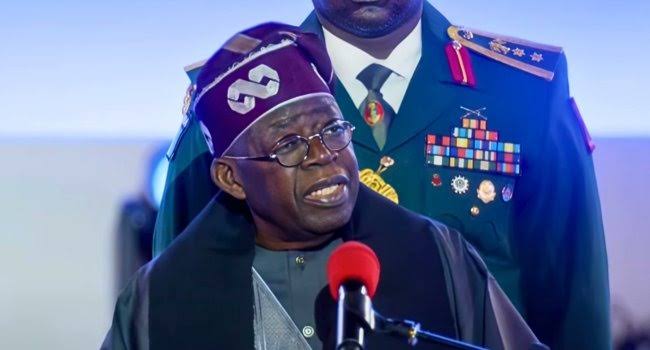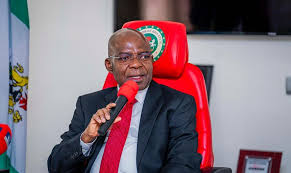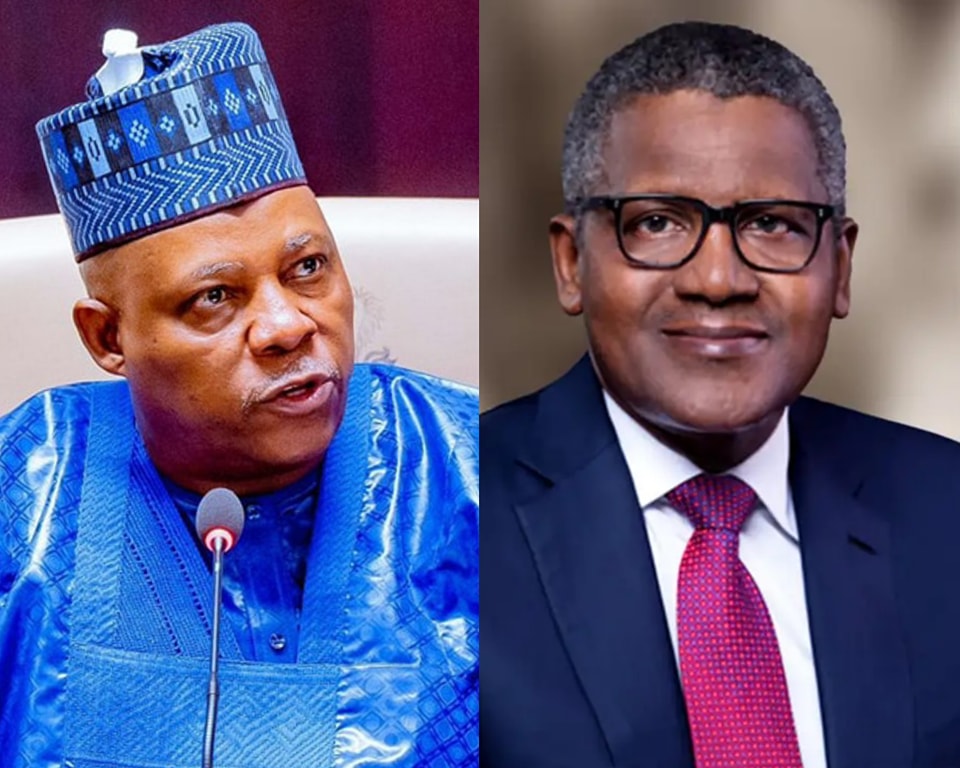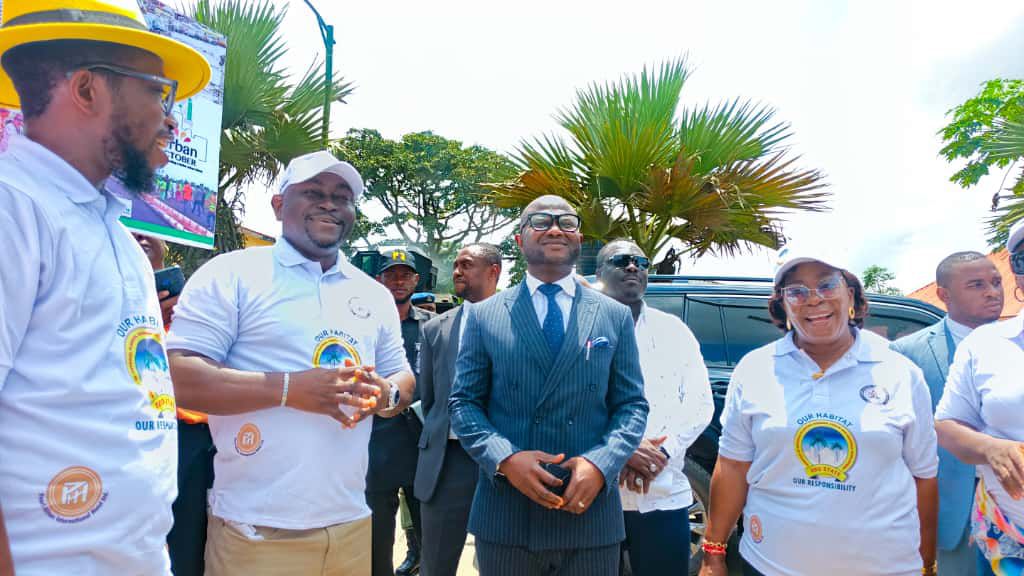By: Goodluck E. Adubazi, Abuja.
In a passionate and pointed remark at the 31st Nigerian Economic Summit, held on Monday, 6th October, 2025, at the Transcorp Hilton, Abuja, Nigeria Vice President Kashim Shettima made a bold statement in defense of Africa’s richest man, Aliko Dangote, saying, “Nigeria is bigger than PENGASSAN.”
Addressing the tension between the Petroleum and Natural Gas Senior Staff Association of Nigeria (PENGASSAN) and Dangote Industries, the VP cautioned against jeopardizing national progress over labour disputes.
“Dangote is not just an individual — he’s an institution,” Shettima said. “If he had invested his billions abroad, he might be worth $80 billion by now. But he chose Nigeria, and we owe it to the nation to protect that investment.”
Calling for patriotism and mutual respect, Shettima urged both organized labor and the private sector to prioritize national interest and resolve disputes through dialogue. He tasked the Nigerian Economic Summit Group (NESG) with making recommendations to help foster industrial peace.
VP Shettima Hails Economic Reforms: GDP Hits $372.8 Billion, Revenue Surges Past Targets
Says Reforms Are “Stabilising the Economy and Restoring Investor Confidence”
Speaking at the Nigerian Economic Summit Group NESG 2025, Vice President Shettima showcased Nigeria’s economic rebound, revealing that the nation’s GDP grew to $372.8 billion in 2024, up from ₦309.5 trillion the previous year.
“There’s now a resounding consensus that our reforms have stabilised our macroeconomic environment,” he stated.
He noted a massive revenue jump from ₦19.9 trillion in 2023 to ₦27.8 trillion by August 2024 — surpassing the ₦18.32 trillion target. The debt service-to-revenue ratio has also improved dramatically, dropping from 97% to below 50%, while the debt-to-GDP ratio stands at a manageable 38.8%.
The VP attributed the improved sovereign rating to these reforms, citing upgrades by global credit rating agencies such as Moody’s and Fitch.
Agriculture, Solid Minerals Take Centre Stage in Nigeria’s Diversification Drive
VP Shettima: “Technology and Yield Are the Future of Nigerian Farming”
As part of the Renewed Hope Agenda, Shettima said the government is prioritising agriculture and solid minerals to tackle unemployment and boost productivity.
“We’re entering strategic partnerships to import modern farm equipment, train farmers, and expand extension services,” he said, highlighting the role of technology and seed quality in improving crop yields.
He also announced that the solid minerals sector generated $12.58 billion in 2024, a record attributed to reforms in mining regulations and licensing.
MSMEs Get $200 Billion Lifeline, Young Nigerians Can Access Up to $100,000 in Capital
Govt Steps Up Support for Startups, Local Industries to Stimulate Job Creation
The administration has created a ₦200 billion intervention fund to empower micro, small, and medium enterprises (MSMEs), alongside a scheme that allows young entrepreneurs to access up to $100,000 in funding.
“This is about building sustainable livelihoods,” Shettima said, noting that financial inclusion through digital microloans is also expanding.
Over 2,700km of Superhighways Under Construction as FG Bets Big on Infrastructure
Massive Transport Investment to Boost Commerce and National Unity
The Vice President announced over 440 active road projects spanning 2,700km of superhighways nationwide, as part of efforts to strengthen connectivity and facilitate economic growth.
Rail lines, bridges, and interstate terminals are also being built to reduce transportation bottlenecks.
Renewed Hope Ward-Based Programme Targets All 8,809 Wards
Bottom-Up Development Modeled After India, China, and Kenya
A major highlight of Shettima’s speech was the Renewed Hope Ward-Based Development Programme, targeting grassroots communities across all 774 local governments and 8,809 wards.
Inspired by successful models in Asia and Africa, the initiative empowers local communities to map resources and influence planning decisions.
“This is development from the bottom up,” he said. “No community will be left behind.”
Tax Reforms Signed Into Law: New Acts Aim to Simplify, Protect Low-Income Earners
Shettima: “We’re Recalibrating the Fiscal System for Fairness and Growth”
Shettima revealed that four major tax-related laws were recently signed: the Nigeria Tax Act, Tax Administration Act, Nigeria Revenue Service Establishment Act, and Joint Revenue Board Establishment Act.
These reforms aim to:
Improve revenue generation
Reduce dependence on oil
Protect low-income earners
Promote digital innovation in tax collection
“We’ll Stabilise, Industrialise, and Humanise Nigeria’s Economy” – VP Vows at Summit
Says Government Is Ready to Implement NESG Recommendations
Shettima closed his remarks with a rallying call for action, saying the administration is determined to:
Stabilise prices and the naira
Industrialise through power and logistics
Humanise governance to make every Nigerian feel served
“We are not condemned to low growth and low trust. We will humanise our economy,” he concluded.
He officially declared the 31st NESG Summit open on behalf of President Bola Ahmed Tinubu.
Nigeria Eyes $1 Trillion GDP by 2030 in New Economic Vision – Minister
In a related development, the Federal Government unveils Bold Targets in the Second National Development Plan (2026–2030)
The Federal Government has announced an ambitious economic blueprint under the upcoming Second National Development Plan (NDP) 2026–2030, targeting a $1 trillion GDP by 2030. According to the Minister of Budget and Economic Planning, Senator Abubakar Atiku Bagudu, the plan will require an average real GDP growth of 8.78% annually, a 17.18% manufacturing contribution to GDP, and 24.78% in the manufactured export share.
“We are setting aspirational but achievable goals guided by the Nigeria Agenda 2050,” Bagudu said during his welcome speech at the Economic Outlook and Policy Direction Summit in Abuja.
Strategic Planning Kicks Off for Nigeria’s Future: NDP Workshop Announced
Govt Launches Stakeholder-Driven Process for 2026–2030 Economic Blueprint
In a major move to shape Nigeria’s economic direction, the Federal Government will host a national workshop to define the vision, objectives, and core policies for the 2026–2030 National Development Plan. The process, as announced by Minister Bagudu, will be inclusive and participatory, involving private sector players, civil society, state and local governments, political parties, labour unions, and marginalized groups.
“This plan will reflect the voice of every Nigerian — from market women to persons with disabilities,” he affirmed.
Stability, Reform, Growth: Govt Sets Path as Current NDP Nears End
Focus on Evidence-Based Policy and Cross-Sector Collaboration
As Nigeria transitions from the 2021–2025 National Development Plan to its successor, the government remains committed to economic reforms that enhance stability and long-term resilience. Senator Bagudu emphasized the importance of “evidence-based decision-making” and inter-sectoral cooperation in driving reform outcomes that lift productivity and reduce structural weaknesses.
“Our aim is to unlock Nigeria’s full economic potential while fostering inclusive growth,” Bagudu said.
Renewed Hope Hits the Wards: FG Launches Grassroots Development Drive
8,809 Wards to Benefit from Inclusive, Bottom-Up Planning
In a landmark move for grassroots development, the Federal Government has unveiled the Renewed Hope Ward-Based Development Programme, a people-centered initiative designed to bring economic reform directly to Nigeria’s 8,809 wards.
“The programme starts at the smallest political unit — the ward — empowering communities to shape their own economic future,” the Minister announced.
Communities will map local resources, human capital, and economic activities, which will inform Local, State, and ultimately, National Development Plans.
“No One Will Be Left Behind”: FG Champions Inclusive Economic Reform
Bagudu Reaffirms Commitment to Shared Prosperity and Poverty Reduction
In closing, Minister Bagudu reaffirmed President Bola Ahmed Tinubu’s administration’s commitment to building a more inclusive and prosperous Nigeria. Acknowledging short-term economic hardships, he stressed that reforms are laying the groundwork for long-term growth.
“We are taking development to the grassroots,” Bagudu stated. “The exchange rate is stabilizing, inflation is easing, and fiscal management is improving.”
The government called on private sector actors, development.













